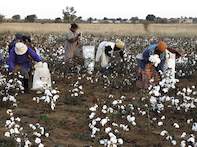The topic of cotton production systems not only refers to the growing of this fibre crop but also to the processing of cotton as well as marketing choices. These should enhance sustainable economic and environmental benefits for all involved in the cotton production and supply chain.

It also includes the concept of ‘traceability’. Traceable cotton can be tracked from the shelf, back to the cotton farm to be able to substantiate claims on the product label.
There are various systems of cotton production, processing and marketing that ensure certain qualities of sustainability, or at least the enhancement of farming conditions for new farmers. These include organic cotton production, the Better Cotton Initiative (BCI), the Cotton made in Africa initiative (CmiA) and Textile Exchange, a global non-profit. In addition, the Sustainable Cotton Cluster (SCC), established by Cotton SA in 2014, involves five stakeholders, including the Department of Trade and Industry (the dti). The basic aim of the cluster is to sustainably grow the South African cotton production and manufacturing industry.
(A short overview of organic cotton production and the BCI follows).
Organic Cotton Production
Organic cotton is produced in an agricultural system that sustains soil health, ecosystems and people by using natural processes rather than artificial and chemical inputs. Organic cotton farming does not allow the use of toxic chemicals or genetically modified organisms (GM cotton).
Organic cotton farming in South Africa was tried but was not yet successful. Most small-scale farmers are dryland farmers and yields were low; 200 – 300kg/ha as organic cotton production requires lots of water. In addition, organic cotton seeds are very expensive and herbicide and pest-resistant genetically modified cotton seeds are not allowed in organic cotton production.
Cotton also needs to be planted in soil that was chemical-free for at least three years.
Successful organic cotton production in countries are often heavily subsidized by their governments which is not the case in South Africa.
The world’s production of organic cotton increased by 56% between 2016/17 and 2017/18 to almost 181 000 tonnes. This only makes up 0.7% of global cotton production.
Almost half of the organic cotton comes from India (47%) while China (21%), Kyrgyzstan (12%), Turkey (6%) and Tajikistan (5%), the USA and Tanzania are other notable producers.
In Africa, Uganda, Benin, Burkina Faso, Egypt, Mali, Ethiopia and Senegal also produce small quantities of organic cotton.
The Better Cotton Initiative (BCI)
The Better Cotton Initiative (BCI) is the world’s largest cotton sustainability programme. This programme works toward sustainable cotton farming, not only in terms of the environment (building soil health, managing water etc.) but also ensuring fair labour practices (e.g. no child labour) and the responsible use of chemicals. The BCI also provides training on sustainable agricultural practices.
According to Cotton SA, some 39% of South Africa’s 2019 cotton crop was compliant with the Better Cotton Initiative (BCI) principles.
By Marinda Louw